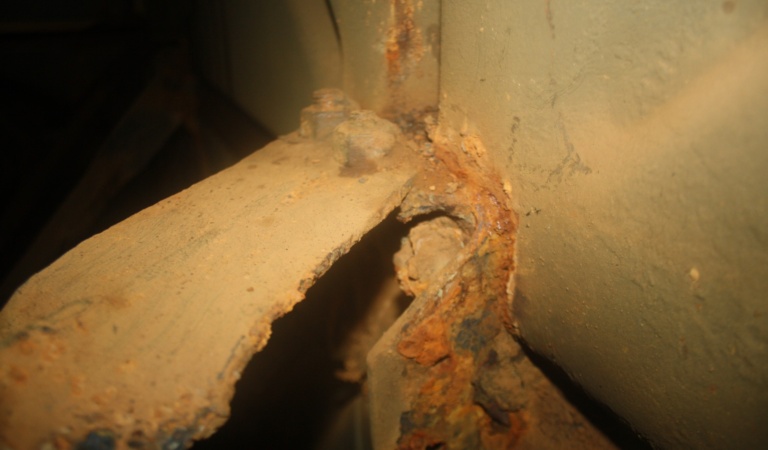 22nd June 2022
22nd June 2022How To Prevent Water Tank Corrosion
Water storage tanks are made to withstand tons of water and last for many years. So it’s no surprise that water pressure can cause damage through wear and tear.
Such damage that water tanks usually sustain is from cracks, leaks, and corrosion. Even though each are all harmful in their own way, corrosion may actually be the worst, especially in the later stages when it’s irreversible.
However, corrosion can be reduced and even prevented (for many years, at least) so that your water tank can continue functioning efficiently.
In this Clarion Water blog, we’ll talk you through what corrosion is and how you can identify it. We’ll also give you some corrosion prevention tips!
What is Corrosion?
Corrosion is the result of chemical reactions, such as oxidation, which causes the deterioration of metal substances.
Most metals are actually very easily oxidised because of the atomic properties of each substance; metal and water. Metals lose electrons to oxygen in the air and in water. Because the oxygen is gaining these electrons, it forms an oxide with the metal and causes it to breakdown.
Corrosion is the most damaging naturally occurring process as it can cause severe damage to water tanks. All metals can corrode when they don’t have protective coatings which also affects how well the tanks function.
How to Identify Corrosion
Metal-prone structures are prone to corrosion and rusting from long term usage. Even regularly cleaned water tanks are susceptible, cracks and leaks within the structure are the ideal place for bacteria nesting spots.
The first signs of corrosion and rusting may just be a general dulling of the surface of your water retaining structure. It also becomes quite rough. Over time, it may cause crumbliness due to the instability of the metal.
When iron corrodes, it begins to rust and this takes on a colour similar to orange-brown which darkens the older it gets. For something that is already that colour, like copper, for example, will show a blue-green appearance once corrosion develops.
If you spot that your tank substrate is breaking down then corrosion is potentially taking place inside of the water structure. At this point, your tank will need either relining or replacing.
Why is it Important to Stop Corrosion?
Corrosion is an extremely costly problem. Some of the biggest structures in the world are potentially susceptible to corrosion just because of the materials they’re made from.
Think of bridges and building exteriors, oil pipelines, and building infrastructure. Not to forget medical instruments and metal plates that go into bodies. If corrosion were to ever occur in these, it can cause the infrastructures to collapse or lead to blood poisoning in people.
Specifically for water tanks, corrosion can cause serious contamination to the water. Bacteria from the actual rusting areas will contaminate the water. When your tank has been corroding, it can cause it to become crumbly and cracks may open, allowing foreign materials to enter and contaminate the water further.
This is bad news for the purpose of many water tanks – agricultural uses, industrial and hospitality industries, as well as potable water storage.
That’s why it’s so important to prevent corrosion in any metal material, not just water tanks.
Corrosion Prevention Methods
Two main solutions to fix the corrosion in water tanks is to get it relined or replaced completely. These methods can help renew your water tank to allow your business to continue without problems.
Even if you needed a complete replacement of your tank, you could still get the new one relined. Tank relining prevents the growth of bacteria which helps to prevent corrosion. So you can also avoid cracking and leaking caused by corrosion.
In the UK, there are regulations that control the coatings that are used for water tank refurbishment which ensure the internal lining will not contaminate the tank’s contents. Our coatings are approved by the Water Regulations Advisory Scheme (WRAS).
The product we use here at Clarion Water offers a flexible lining for water tanks. It’s a solvent-free polyurethane coating designed for relining potable and drinking water tanks and provides excellent protection against corrosion.
Over the past 15 years, we’ve been providing these services to customers but we wanted to use something better. That’s why our most recently developed lining system is spray-applied Polyurea. Spray-applied Polyurea is touch dry in 5 seconds and can be applied to large areas very quickly.
Both of our coating systems are guaranteed for 10 years!
CWS: Contact Us
We have a cumulative 30 years of experience and knowledge in the water hygiene and Legionella industry here at CWS.
We install, repair, refurbish, reline and replace cold water tanks.
Get in touch with our team today by calling us on 01943 872 311 or sending an email to info@clarionwater.co.uk. We’re happy to help you.